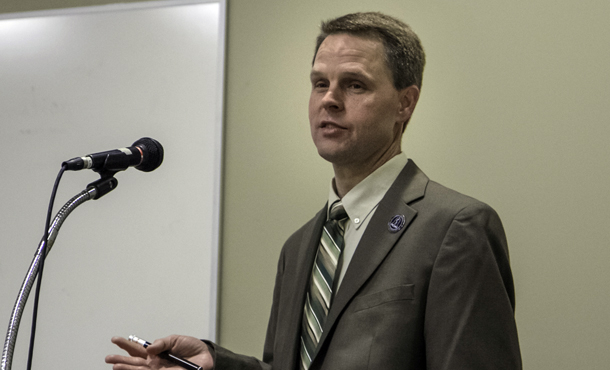The human body has an amazing ability to recover from and prevent infection. When viruses and bacteria attack, a variety of infection-fighting cells, or immune cells, defend the body. These cells also try to prevent future infections.
How can immune cells do this? Biologists only know part of the answer. Scientists like Joseph W. Brewer, who recently spoke at a Suter Science Seminar at Eastern Mennonite University, work to answer questions about how exactly immune cells fight infection.
Brewer, an associate dean of research at the Liberty University College of Osteopathic Medicine, currently focuses his immunology research on B cells. These cells recognize a specific pathogen and then produce antibodies, proteins that help fight invaders like viruses and bacteria. In becoming equipped to produce specific antibodies, B cells undergo a transformation. It is this transformation that Brewer hopes to understand.
B cells grow much larger as the begin to make large amounts of a specific kind of antibody, and Brewer studies the chemical chain reaction that controls how the endoplasmic reticulum, the part of the cell that makes antibodies, grows larger. In other words, he studies chemicals that allow B cells to change from a small insignificant cell into a much larger cell he calls “an antibody factory,” without growing out of control.
Brewer has created a successful career of melding research and education. After earning a PhD from Duke University, he spent eight years at Loyola University’s Stritch School of Medicine in Chicago, Illinois, and six years at the University of South Alabama College of Medicine.
Every scientist needs four “puzzle pieces” for a successful career, he said. These contributing factors include mentors, colleagues, a drive for discovery, and direction.
Speaking of his mentors, Brewer discussed several professors and fellow students that encouraged him to learn and gave him the tools he uses today to conduct research. He also referenced the work of colleagues, students, and scientists with whom he worked in laboratory settings.
Passion to acquire new knowledge and fuel the hard work that leads to ground-breaking discoveries is also important, Brewer said. This passion is “worth getting up early for, it’s worth working hard for, it’s worth staying up late for [to] see something or understand something for the first time perhaps in the history of the world.”
Brewer truly enjoys discovering how B cells work. “For me, it’s just a lot of fun to think about how things work,” he said, “but to get funding you have to convince other people that your research has some biomedical relevance.” Fortunately, B cells are very important in medicine. Not only do immune cells fight infection, but they also are responsible for a variety of autoimmune diseases and cancers. Perhaps future doctors can use what he discovers to heal such diseases.
In terms of the final puzzle piece, Brewer says that although he moved from one laboratory to another repeatedly over the course of his career, his direction never changed. “I know God wants to show us the path of life. He tells us that all over scripture.”
Brewer sought an appointment at Liberty’s new osteopathic medical school before it opened to its first class in the fall of 2014, and then moved his family from Mobile, Alabama to Lynchburg, Virginia. “To be a part of helping build a Christian medical school, literally from the ground up, would be a once in a lifetime experience,” he says in a Liberty University faculty spotlight. “My wife and I are so humbled that God opened the door for us to be a part of this incredible blessing.”
Brewer spoke as part of EMU’s Suter Science Seminar series. Lectures are presented by experts in their field and are free and open to the public. Avrama Kim Blackwell, a professor in the department of molecular neuroscience at George Mason University, will speak March 30 at 4 p.m. in the Suter Science Center about how nerve cells in the striatum store memory, and how that relates to Parkinson’s Disease.
